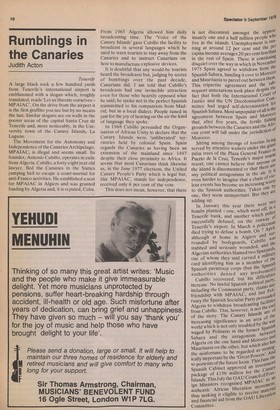Rumblings in the Canaries
Judith Acton
Tenerife A large black rock a few hundred yards from Tenerife's international airport is emblazoned with a slogan which, roughly translated, reads 'Let us liberate ourselves — MPAIAC'. On the drive from the airport it is the first graffito you see but by no means the last. Similar slogans are on walls in the poorer areas of the capital Santa Cruz de Tenerife and, more noticeably, in the University town of the Canary Islands, La Laguna.
The Movement for the Autonomy and Independence of the Canaries Archipelago, MPAIAC, is illegal and seems small. Its founder, Antonio Cubillo, operates in exile from Algeria. Cubillo, a forty-eight year old lawyer, fled the Canaries in the Sixties jumping bail to escape a court-martial for anti-Franco activities. He established a seat for MPAIAC in Algiers and was granted funding by Algeria and, it is reputed, Cuba. From 1965 Algeria allowed him daily broadcasting time. The 'Voice of the Canary Islands' gave Cubillo the facility to broadcast in several languages which he used to warn tourists to stay away from the Canaries and to instruct Canarians on how to manufacture explosive devices.
It is doubtful that any would-be 'tourists heard the broadcasts but, judging by scores of bombings over the past decade, Canarians did. I am told that Cubillo's broadcasts had one invincible attraction even for those who heartily opposed what he said; he spoke not in the perfect Spanish transmitted to his compatriots from Madrid, but in a local dialect. People tuned in just for the joy of hearing on the air the kind of language they spoke.
In 1968 Cubillo persuaded the Organisation of African Unity to declare that the Canary Islands were 'unliberated' territories held by colonial Spain. Spain regards the Canaries as having been an extension of the mainland since 1497 despite their close proximity to Africa. It seems that most Canarians think likewise as, in the June 1977 elections, the United Canary People's Party which is legal but, like MPAIAC, stands for independence, received only 6 per cent of the vote.
This does not mean, however, that there is not discontent amongst the aPPr02‘imately one and a half million people who live in the islands. Unemployment is running at around 12 per cent and the pet capita income averages 20 percent less than in the rest of Spain. There is continuing disquiet over the way in which in November 1975 Spain agreed to withdraw from the Spanish Sahara, handing it over to Morocco and Mauritania to parcel out between thou. This tripartite agreement and the subsequent annexations took place despite the fact that both the International Court of Justice and the UN Decolonisation Conlmtttee had urged self-determination for Spanish Sahara. Most unpopular of all is the agreement between Spain and Morocco that, after five years, the fertile fishing grounds between the Canaries and the Aft'," can coast will fall under the jurisdiction 01 Morocco. Sitting among throngs of tourists bel served by attentive waiters under the giant palm trees of the Plaza General Franco Ult Puerto de la Cruz, Tenerife's major tourls resort, one cannot believe that anyone cf the island is discontented or that there 9'7 any political antagonisms in the air. It. Is even harder to imagine that a chain of 0° lent events has become an increasing wor.rY to the Spanish authorities. Taken one I°Y one, they seem unimportant. But they are adding up. In January this year there were ,rx: bombs planted — one, which went off, IU e Tenerife bank, and another which P°1Icf successfully defused, on the runway Tenerife's airport. In March a policerna.:' died trying to defuse a bomb. On 7 April, although at home in Algiers and sur s rounded by bodyguards, Cubillo stabbed and seriously wounded, and the Algerian authorities blamed two Span.laru...: one of whom they said carried a milIta,12, card identifying him as a member of tu_:: Spanish paratroop corps (but the Sparlo!:. authorities denied any involvemen_11, Cubillo recovered, but his difficultf increase. No lawful Spanish political Par?„' including the Communist party, clairrisan friendship with MPAIAC, and last Feb'7 ruary the Spanish Socialist Party persuaded 0" Algeria to withdraw broadcasting facilities from Cubillo. This, however, is not the are of the story. The Canary Islands of the increasing significance in an area world which is not only troubled bysthpeari wisl; waged by Polisario in the former Sahara and the antagonism hetw`_d Algeria on the one hand and Morocco r Mauritania on the other, but which also hea" the misfortune to be regarded as str ,t ically important by the 'Great powers'.'i:-!',,,e' so portents of the future loom. This J us the Spanish Cabinet approved an eln" package of £196 million for the EWr Islands. This July the OAU CounicAlc as otn ign Ministers recognised MPA mc)velitieer; authentic African liberation thus making it eligible to receive ma and financial aid from the OAU Liberation Committee.


































 Previous page
Previous page